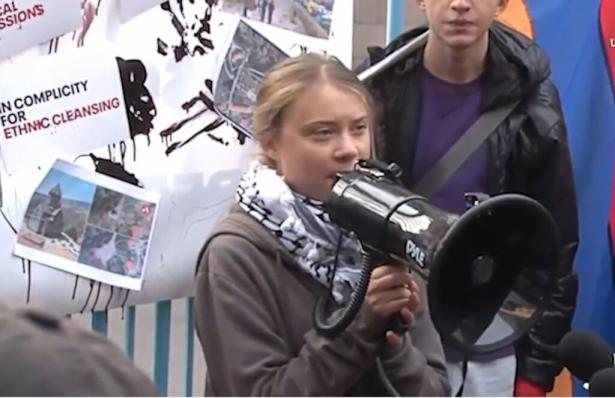It’s been six years since that white, middle-class teenage girl with autism stood before world leaders at the UN Climate Summit and exclaimed indignantly “How dare you!” Greta Thunberg became an object of ridicule—not only from climate change deniers and conservative politicians, but also from parts of the anti-capitalist left. To them, the so-called awkward blonde girl with the pigtails was a greenwashing tool for corporate capitalism, with suspiciously easy access to global media platforms and multinational organisations.
By now, you’d think that many of her critics—on both ends of the political spectrum—might have offered an apology. After all, Greta was simply a young girl moved to action by the greatest threat facing our planet—one that her generation will be forced to pay for dearly. And what’s been proven over these six years? That she was never a puppet of capital, never a distraction from the real struggle, never a spokesperson for green neoliberalism.
In fact, the more Greta developed a sophisticated critique of the global economic and political order, the more she disappeared from mainstream media—despite her enduring influence on European social movements and her persistent political interventions. Meanwhile, much of the left failed to conduct even the slightest self-criticism of how it misread and mistreated the “Greta phenomenon.” It simply couldn’t stomach the idea that a privileged, white Swedish girl could be truly anti-capitalist, capable of intersectionally linking contemporary struggles, without being politically “baptised” in the ways we were.
And yet, Greta stands as a defining figure in the political awakening and radicalisation of today’s youth. This generation isn’t waiting for mass parties or traditional movements to lead the way. They take to the streets, invent their own repertoires of action (see Fridays for Future), maximise digital tools and connectivity, and articulate a holistic anti-capitalist discourse that ties together the climate crisis, social inequality, neo-colonialism, and racism. No one has to sit them down and explain that it’s all connected—they already know.
That’s why it came as no surprise to many of us when Greta stood in solidarity with Palestine. Her words—
“If you, as a climate activist, don’t also fight for a free Palestine and an end to colonialism and oppression all over the world, then you should not be able to call yourself a climate activist“
—echo the ethical clarity of a generation that refuses to be neutral. In the defining moral confrontation of our time, young people like Greta are choosing sides, and doing so in the most radical way they can. Some sail to Gaza with humanitarian aid. Others wave Palestinian flags at their Harvard graduation. A few shout “Free Palestine” in keffiyehs after winning a boxing match.
But the defamation of those who stand with the Palestinian people has reached disturbing levels. The global alt-right propaganda machine, now deeply embedded in the most popular social media platforms, works overtime to spread fake news, discredit activists, obscure the wave of international solidarity, and sow confusion. Just yesterday, a crudely doctored photo made the rounds: Greta supposedly holding an Aperol Spritz aboard the humanitarian aid ship. It spread like wildfire among the same people who mocked the “spoiled autistic teen” back in 2019—and yes, even some segments of the Left, ever eager to feel validated in their mistrust of “Green Greta,” shared it too.
But the real tragedy isn’t just how easily people fall for AI-generated lies and disinformation. It’s how intolerable it’s become to accept that some young people still dare to act spontaneously, genuinely, politically disrupting the apathy and cynicism that so many have grown comfortable with.
In a time when ressentiment seems to be the dominant political emotion in our societies, people who care about more than their own skin become a source of irritation. Not just for the powerful—but for the powerless, too. For those who can no longer even lift their eyes to the sky, let alone question, demand, or become like Greta. In a world consumed by ressentiment, choose to be like Greta.
[See our publication on the role of emotions in politics, including a discussion on the concept of ressentiment: “Feel the Change You Want to See”: The Role of Emotions in Politics”]
Originally published in Greek in Epohi newspaper
Angelina Giannopoulou is an Athens-based political scientist and facilitator of the “European Integration and the Strategic Perspectives of the Radical Left” programme at transform! europe. She holds master’s degrees in political sociology and religious studies and is a PhD candidate in political science at Sophia University Institute in Florence. She is also a member of the Coordination Team of the Dialop Project for the Christian-Marxist Dialogue.
transform!europe is a network of 38 European organisations from 22 countries, active in the field of political education and critical scientific analysis, and is the recognised political foundation corresponding to the Party of the European Left (EL). This cooperative project of independent non-profit organisations, institutes, foundations, and individuals intends to use its work in contributing to peaceful relations among peoples and a transformation of the present world.


Spread the word